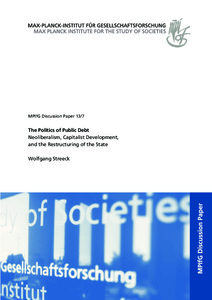The politics of public debt: neoliberalism, capitalist development, and the restructuring of the state
"Rising public debt has been widespread in democratic-capitalist political economies since the 1970s, generally accompanied among other things by weak economic growth, rising unemployment, increasing inequality, growing tax resistance, and declining political participation. Following an initial...
| Main Author: | |
|---|---|
| Institution: | ETUI-European Trade Union Institute |
| Format: | TEXT |
| Language: | English |
| Published: |
Köln
2013
MPIfG |
| Subjects: | |
| Online Access: | https://www.labourline.org/KENTIKA-19126958124919441309-The-politics-of-public-debt-ne.htm |
| Summary: | "Rising public debt has been widespread in democratic-capitalist political economies since the 1970s, generally accompanied among other things by weak economic growth, rising unemployment, increasing inequality, growing tax resistance, and declining political participation. Following an initial period of fiscal consolidation in the 1990s, public debt took an unprecedented leap in response to the Great Recession. Renewed consolidation efforts, under the pressure of "financial markets," point to a general decline in state expenditure, particularly discretionary and investment expenditure, and of extensive retrenchment and privatization of state functions." |
|---|---|
| Physical Description: | 24 p. Digital |

